THE FIFTIETH ANNIVERSARY OF THE ARRIVAL OF THE CAMILLIANS IN
BURKINA FASO
Ouagadougou – Wednesday, 12 October 2016
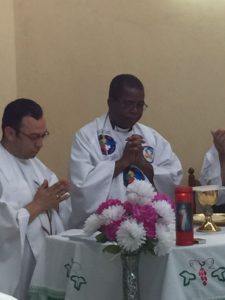 The third day of the meeting began with morning prayers and the celebration of the Eucharist presided over by Fr. Laurent Zoungrana, the Vicar General of the Order and a religious from Burkina Faso who is an expression, through his own vocational history, of the beginnings of the fifty years of presence of the Camillians in this African nation.
The third day of the meeting began with morning prayers and the celebration of the Eucharist presided over by Fr. Laurent Zoungrana, the Vicar General of the Order and a religious from Burkina Faso who is an expression, through his own vocational history, of the beginnings of the fifty years of presence of the Camillians in this African nation.
In the opening prayer, Fr. Laureant thanked the Lord for the gift of the charism given to the Order of Camillians; for the Camillians who for the second time were celebrating their annual meeting of major Superiors in Burkina Faso; for the first Camillian missionaries who had expanded and borne witness to the charism of mercy in the Americas (starting with Peru), in Asia (with the work of Fr. Antonio Crotti), and in Africa (with Fr. Stanislao Carcereri at the outset who followed in the footsteps of the Blessed Daniele Comboni and then with the arrival of the Camillians of the Province of Rome).
The morning and the afternoon of this third day of the meeting (chairman Fr. Laurent Zoungrana) were dedicated to a debate of the major Superiors who were organised into ‘continental blocs’ (Europe, Africa, Asia, and the Americas).
The subjects for the reflections of the groups were: the possibility of inter-Provincial cooperation, starting with the Camillian Project; the challenges/future for the continents to which they belong; and cooperation at the level of ministry and formation. The European Provinces were asked to focus on the prospects for their own survival (fusion, union, amalgamation, closing down, moving to being a Delegation of…) and they were also asked to conserve these reflections and then develop them in their respective Provincial Chapters. Lastly, there was ‘the question of the diaspora of religious in different Provinces’. The participants were invited to be practical and realistic in their proposals, taking into account the realities and contemporary situations in which they live, with their respective lights and shadows.
The Continent of EUROPE
Without too many preambles, it is evident that the European Provinces are experiencing a fall in the number of their religious, with the exception of the Province of Poland. Many religious institutes have begun a process of unification, fusion and amalgamation.
However, the ageing of religious is not the only aspect that has to be considered when thinking of a possible fusion/union of Provinces. There are also other criteria that should be taken into account: language, the use and destination of our material possessions, and the reorganisation of the charismatic presence in the homelands of the religious. In addition, we should also ask ourselves who should take the initiative in the process of fusion and who should attend to directing the dynamic of fusion.
At the present time some European Provinces have chosen to strengthen their agreements with other younger and more dynamic parts of the Order: offering culture, formation and history in exchange for youth, enthusiasm…and some problems as well!
Governance is needed starting with the general government of the Order which should assure guidelines that can manage union, overcoming provincialism, not being satisfied with being only spectators of the self-referring management of individual actors, and addressing the inevitable tensions that may arise.
Looking to the present and the future, the request was made to continue with the improvement of shared formation: studying, living and growing together helps knowing about each other in diversity and this can be used to advantage in a future of unity. It also helps to improve a sense of belonging to the Order and thereby overcomes regionalism.
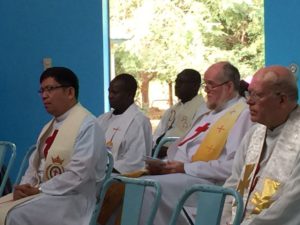 Fr. Leocir Pessini, the Superior General, suggested that the next Provincial Chapters of the Provinces of Europe, as early as the year 2017, should theorise in a specific way the question of their future – this would be an opportunity to offer new sets of criteria.
Fr. Leocir Pessini, the Superior General, suggested that the next Provincial Chapters of the Provinces of Europe, as early as the year 2017, should theorise in a specific way the question of their future – this would be an opportunity to offer new sets of criteria.
In Europe, the sense of belonging to a Province has always been a great value, a motivation for commitment, almost a personal identification. Until a few years ago this was a point of strength. It is now becoming a noose that imprisons us and makes us less free in our choices. Often there are emotions and fears which are at times irrational…It is no good concealing them. Articulating them can help us to convert them or be less subject to them.
Hitherto the fusion of European Provinces has not met with much success: there have been differences of language, cultural tensions, historical questions.
Much more substantial is the consensus on moving towards a project of joining parts of the Order outside Europe that are young but dynamic, trying to create synergies in Europe with the injection of new resources from the extra-European context.
The question of the diaspora of religious: the number of religious sent to Europe by parts of the Order in other continents is such that it is no longer possible to reduce this phenomenon to being something that is extemporaneous. It is becoming a systematic approach that is assuring the very functioning of some Provinces. As such, one perceives the need to regulate this presence (providing guidelines) which will steadily acquire the profile of ethnic communities abroad that will have a certain autonomy in relation to the Camillian presence in their local areas.
The continent of ASIA
Problems relating to the ending of Provinces do not exist. Rather, there are various projects for cooperation between different Provinces, above all in the field of formation (a period of the novitiate, formation in philosophy and theology, ministerial experiences). The question of the sending of religious in mission from one Province to another was discussed.
Concrete proposals and/or initiatives: the opening in Asia of a common house for candidates for mission in India, the Philippines and Indonesia; beginning a mission in Cambodia; as regards the mission in China, the proposal was made to explore the real possibilities of reopening the mission in this large continent; the major Superiors of the Order were invited to send religious and students to the centres for pastoral care in the Philippines and India which offer excellent CPE courses and courses in pastoral care in health; encouraging cooperation with CADIS, making available at least one religious to prepare himself for this in each Province.
A brief update on the mission in Indonesia: this is a land that is very promising at the level of vocations; many candidates are already in the novitiate; others are studying philosophy and theology. One can perceive a great future for the Camillian experience in this land, in particular in the Island of Flores.
The continents of NORTH AND SOUTH AMERICA
The Camillians have many shared elements – above all in South America – which can assure pathways of increasing unity and cooperation (the Camillians have been present in the Americas for over 300 years).
For about twenty years there have been meetings of men and women Camillians who provide formation; there have also been annual meetings of all the major Superiors; of all the heads of Camillian centres for formation; and of all the heads of pastoral care (chaplains).
At the planning level, a feasibility study is being continued for a single novitiate for the whole of the Americas, to be established in Brazil, with a single project for formation, with increasing synergy between those people who provide formation.
Over the next few years, a unitary meeting is proposed for all the members of the Lay Camillian Family in the Americas; for all of the financial administrators; and for the heads of communication and archives in order to gather historical data on a very important Camillian presence which deserves to be known about and shared.
The continent of AFRICA
In western Africa there is also a very close form of cooperation above all else at the level of formation. This synergy is more difficult with the Camillian structures of eastern Africa (Kenya, Uganda, Tanzania). The Delegation of Kenya, in particular, should take a strong initiative in this process of greater cooperation and unity.
It is important to dedicate resources to the study of languages which can help in the creation of knowing about each other and cooperation. It is increasingly necessary to return to a culture of internationality, of free giving, and above all else of a sense of mission.
The need was seen to purify the motivations for religious being chosen and then sent out on ‘mission’ (both those of the Superiors that send them out and those of the individual religious who are sent out). There was agreement on the need to establish a clear agreement with the religious that are sent out on mission and with the Provinces that receive them: objectives, time scales, remuneration.
Once again reference was made to the responsibility of the General Consulta to direct this epochal change as regards the various Camillian areas of the world, above all the flow of ‘young and dynamic’ religious from Africa to Europe: what kind of Camillian presence and meaning do we want to assure for the near future?



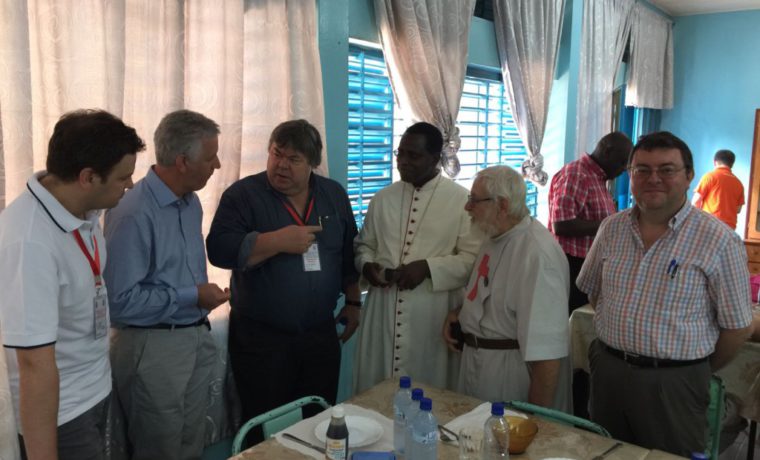

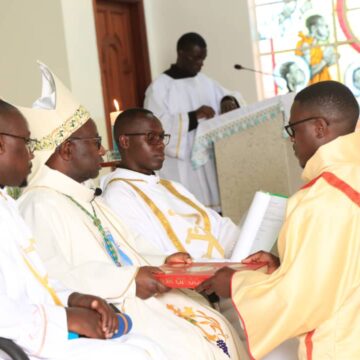

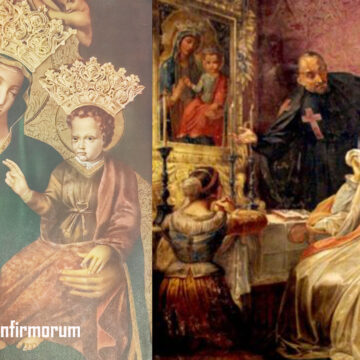

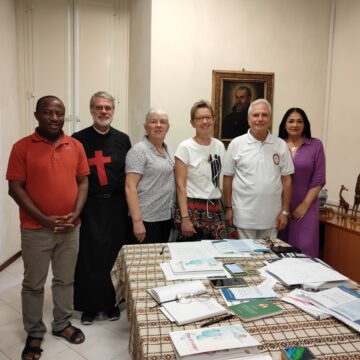

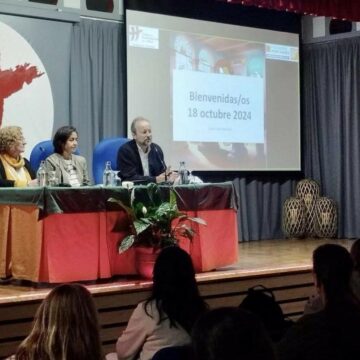
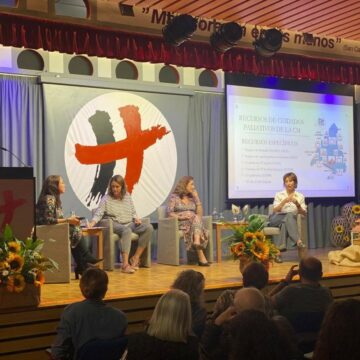
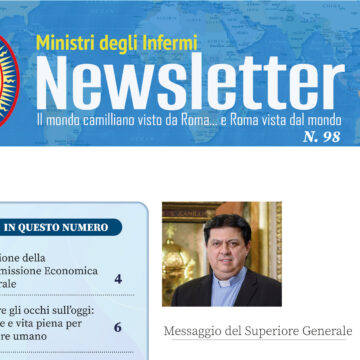
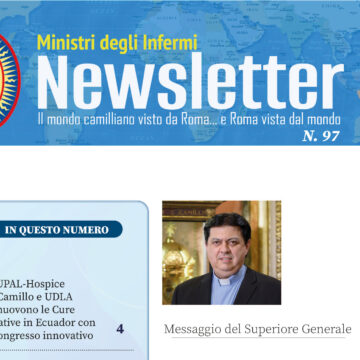
Camillians on Facebook
Camillians on Twitter
Camillians on Instagram